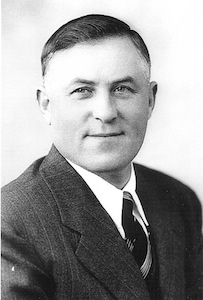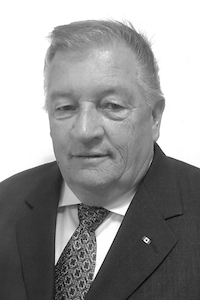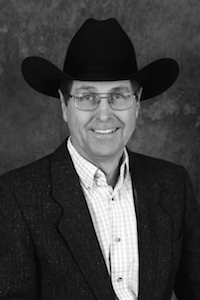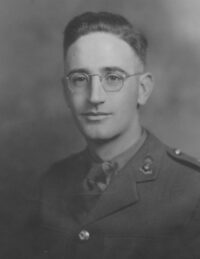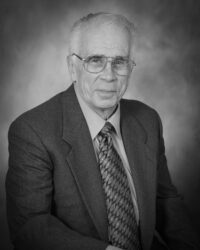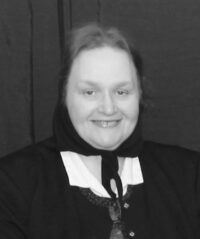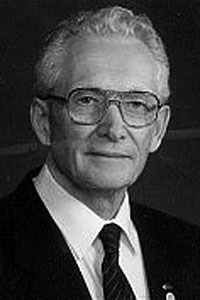Jake Schulz was born in Russia and raised in Romania. At age 20 he was promoted to Sergeant in the Romanian Calvary, and at 26 he was elected to his village council. In 1930, during the Great Depression, Jake, his wife, Amelia (Kelm), and their first child, Herbert, immigrated to Canada where they settled in the Grandview area. By 1936, the Schulzs had acquired an additional half section of land, which they eventually expanded into a successful two-section farm. Their second son, Paul and daughter, Lily were born in Canada. Mr. Schulz was an early adopter of new technologies: a one-way disc to replace the plow; a straw chopper on his combine; legumes to replace summerfallow; a generator to electrify...
AHOF Members archive
Van Ryssel, Neil
A third generation farmer, Neil’s grandfather immigrated to Canada from Belgium in the early 1900’s and settled on the current farm in 1910. In high school, Neil began working with bees and eventually grew his operation to 200 hives. In 1970, he sold his bees when he and his father invested in a new free stall barn with milking parlour. Although his roots quickly grew deep in the dairy industry, he recognized early on that diversification would allow his family farm to flourish. Neil, and his son Jeff’s grain enterprise have since expanded to over 4,000 acres. Throughout his career, Neil has served in a variety of capacities including various directorships and presidential roles for local, provincial and national agricultural...
More, Dr. Everett
Dr. More was born in Deloraine, Manitoba and graduated in 1972 with a Doctor of Veterinary Medicine from the Western College of Veterinary Medicine in Saskatoon, Saskatchewan. Dr. More has practised Veterinary Medicine as a partner in the Virden Animal Hospital for 44 years. The focus of his practise has been on large animals with an emphasis placed on equine practise in the latter part of his career. Dr. More has been an integral part of the equine ranching industry for nearly five decades. His significant expertise in equine medicine has provided care to thousands of horses that produce pregnant mares’ urine. Estrogens are then extracted and made into medicine that millions of women in more than 100 countries...
Parker, Jack
John (Jack) Marsden Parker began his working career in 1938 working for the Dominion of Canada Department of Agriculture where he served under Dr. Ellis as part of the team that completed the Soil Survey of Manitoba. After serving overseas in WWII, he was hired in 1946 as the province’s first Soils Specialist with Manitoba Agriculture. He travelled the province identifying soil-related issues and designing on-farm programs to solve them. In 1954, the Minister of Agriculture established the Soils and Crops Branch and commissioned Jack to direct and supervise soils, crops, forage horticulture, and weed control services being delivered in Manitoba. Jack took it upon himself to organize “Save the Soils” clubs, and he engaged farmers in a variety of demonstrations...
Newton, Weldon
After being raised on the family farm, Weldon attended the University of Manitoba where he obtained his degree in Agriculture majoring in soil science. Weldon and his brother Murray took over the farm, a farrow to finish hog operation as well as a grain operation growing cereal grains, canola, pulse crops and forage seed, in 1984 when their parents retired. Weldon along with his brother Murray and sister-in-law Donna were named the 2002 Red River Exhibition Farm Family of Year. Weldon joined the Manitoba Hog Producers Marketing Board in 1973 and served for 20 years. In 1984, as the Manitoba representative on the Canadian Pork Council, Weldon was part of the committee that developed the first “Recommended code of practice...
McPhee, Gordon
For most of his career, Gordon has played a major role in preserving one of our most precious resources, the soil and working with the agricultural industry towards sustainable development. Together with his wife Mary, Gordon has always been able to look at what was happening on farms and then be quick to acknowledge that there had to be a better way. He saw that farms were getting so big that he realized he needed to get his work done with less effort. Renowned for his determination, he also realized the significant responsibility he had in ensuring soil conservation. As one of the pioneers of zero-tillage in Manitoba, Gordon was a believer in the economic benefits of working with nature...
Maendel, Selma
Selma Maendel was the eighth daughter of Sarah (nee Wurtz) and Peter Maendel of Fairholme Hutterite Colony. Selma has been described as a staunchly proud member of the Hutterite community who exhibited all of the qualities often associated with this background – those being unique, distinctive, industrious, humble, caring, deeply religious and very private. Selma has been noted to combine these traditional characteristics with an enhanced leadership style, respectful nature, courage of conviction, tolerance of others and inquisitiveness, which made her stand out and allowed her influence to extend well beyond the borders of colony life. It was Selma’s hard work and determination that contributed to the colony and, as most are aware, it is these colonies that have contributed...
Hall, A.E.
A.E. (Bert) Hall was born in 1920, and was raised on a farm near Manitou. In partnership with his brother, he established the first registered turkey hatchery in Manitoba, under the name Hall Bros.. During the war years, he served in the R.C.A.F., and was married to his wife, Clara. They raised three sons, Derryl, Walter, and Ray. Prior to the war, with his brother, there was the establishment of the first registered turkey hatchery in Manitoba under the name Hall Bros. In 1956, Bert assumed the position of General Manager and director of Manitou Broiler Farms Ltd.. He participated in the organization of the Manitoba Broiler Industry Association, and was chairman. During 1968, the Manitoba Government established the Manitoba...


